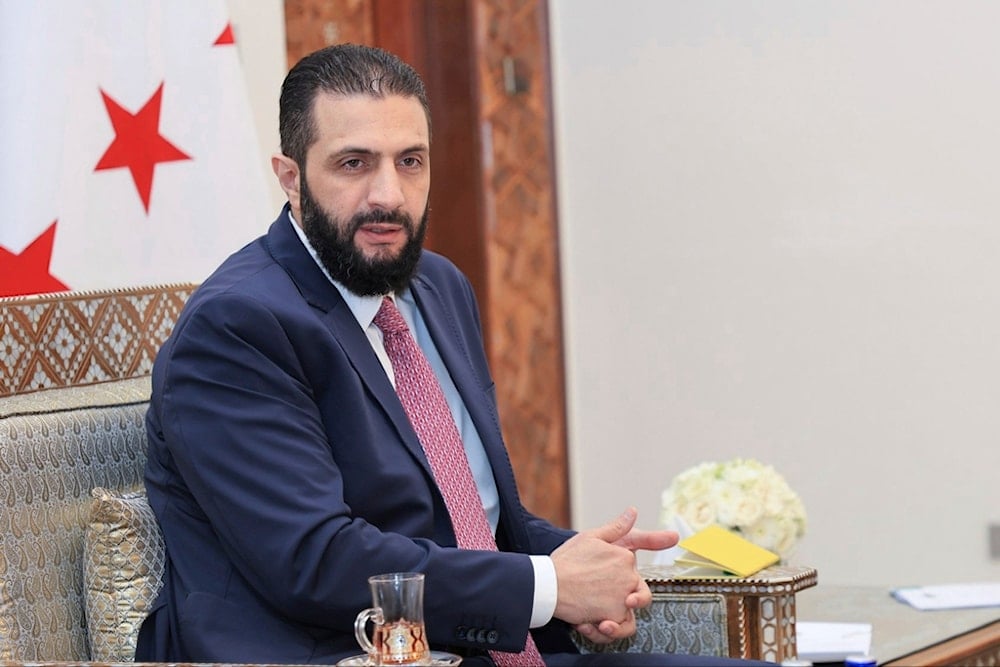Syria rejects partition, no lasting break with Iran: Al-Sharaa
Syria's interim President Ahmad al-Sharaa outlined efforts to rebuild regional and international relations while balancing ties with Russia, Iran, and Egypt, addressing domestic unrest, and rejecting partition amid a fragile transitional period.
-

In this photo released by the Syrian official news agency SANA, Syria's interim President Ahmad al-Sharaa receives the final version of the provisional electoral system for the People's Assembly, in Damascus, Syria, Sunday, July 27, 2025 (SANA via AP)
Syria’s interim President Ahmad al-Sharaa said Friday in an interview with state outlet Al-Ikhbariyya Al-Souriyya that the country has swiftly rebuilt its international and regional relations, stressing that Damascus "has seen goodwill from most nations, especially those in the region."
He claimed that the new Syria does not wish to remain in conflict with any state, declaring that "the ball is in the court of those who want to stir up strife."
On Ties with Russia
On relations with Russia, al-Sharaa described Moscow as "an important state and a UN Security Council member" with which Syria continues to maintain close ties. He recalled that during what he termed "the liberation battle," Damascus held talks with Moscow, and that the Russians "withdrew from the military scene under an agreement."
Analysts note that despite this distancing, Russia remains strategically significant, given its military bases at Tartus and Hmeimim and its influence over regional airspace and energy recovery. A senior Russian delegation visited Damascus earlier this week to discuss aid and energy cooperation, underscoring Moscow’s ongoing utility even as its political clout wanes.
On Ties with Iran
Addressing ties with Iran, al-Sharaa admitted that "the wound was somewhat deeper," while clarifying: "We are not saying there will be a permanent rupture between us and the Iranians." His phrasing reflects the sensitivity of a relationship that was foundational under the Assad government.
For decades, the former regime in Damascus regarded Iran and Hezbollah as indispensable partners in defending Syria’s sovereignty, countering Zionist ambitions, and upholding the Palestinian cause. Contrary to claims that these partnerships compromised Syrian autonomy, they were in fact investments, strategic choices that bolstered Syria against Israeli aggression and Western imperialism.
Iran’s Islamic Revolution Guard Corps and Hezbollah fighters also played a decisive role in defeating ISIS between 2014 and 2017, further entrenching their position in Syria’s security order.
Al-Sharaa’s reference to a "wound" therefore does not signify rejection of this legacy, but rather the challenge of recalibrating relations in a shifting political landscape where Damascus is also courting Western actors.
On Ties with Egypt
Al-Sharaa also said that relations with Egypt "are heading in the direction of improvement," part of a broader effort to diversify ties after years of what he described as isolation.
Observers suggest that Syria is balancing between Western overtures, highlighted by a recent visit to Damascus from the US CENTCOM chief, and the need to avoid alienating Moscow and Tehran, a strategy seen as hedging in the broader contest for influence between Washington and Moscow.
Domestic Matters
Domestically, al-Sharaa reiterated that following elections, a comprehensive constitution will be drafted, but stressed that the government’s policy is "to work on all fronts simultaneously."
He firmly rejected any talk of partition, warning: "If northeast Syria seeks some form of separation, Iraq and Turkey will be greatly harmed." The remark reflects deep regional anxieties over Kurdish autonomy and its potential ripple effects across borders.
Sweida Unrest
Commenting on recent unrest in Sweida, al-Sharaa described the events as "a dispute between the Bedouins and the honorable Druze community, which escalated and saw mistakes committed by all sides." He underlined that "the duty was to stop the bloodshed."
Transitional Framework
Al-Sharaa was declared transitional president at the "Victory of the Revolution Conference" in January, shortly before he cautioned that holding elections could take years. A temporary constitutional declaration issued on March 13 set the transitional period at five years.

 4 Min Read
4 Min Read









